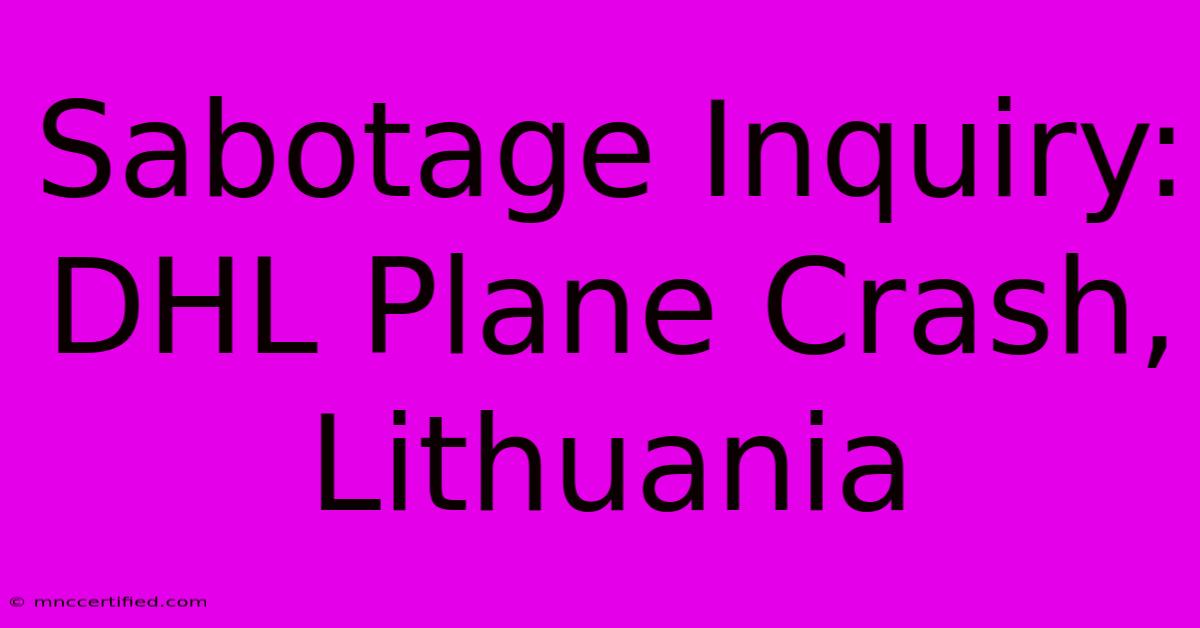Sabotage Inquiry: DHL Plane Crash, Lithuania

Table of Contents
Sabotage Inquiry: Unraveling the Mystery Behind the DHL Plane Crash in Lithuania
On August 4, 2023, the world watched in shock as a DHL Boeing 737 freighter crashed in Vilnius, Lithuania, shortly after takeoff. While initial reports pointed towards a technical malfunction, the subsequent investigation has taken a dramatic turn, focusing on the possibility of sabotage. This article delves into the ongoing inquiry, examining the evidence, theories, and the international implications of this tragic event.
The DHL Crash: A Timeline of Events
The crash of the DHL Boeing 737-400, registered as EC-MFP, occurred just minutes after its departure from Vilnius International Airport. Eyewitnesses reported seeing the aircraft struggling before plummeting to the ground. The two pilots, thankfully, survived the incident with serious injuries. However, the aircraft was extensively damaged.
Immediate Aftermath: The immediate response focused on rescue efforts and securing the crash site. Early reports suggested possible mechanical failure.
Investigation Begins: Lithuanian authorities quickly launched an investigation, involving experts from various aviation safety agencies.
Shifting Focus: As the investigation progressed, evidence emerged that pointed away from a straightforward mechanical fault. Reports of unusual activity prior to the crash began surfacing, leading investigators to consider sabotage as a viable theory.
Evidence Suggesting Sabotage: A Closer Look
While the official investigation remains ongoing, several pieces of evidence have fueled speculation about potential sabotage:
-
Unusual Flight Path: Some accounts suggest the plane's flight path deviated from its intended course shortly before the crash. This deviation, while seemingly minor, could be significant.
-
Onboard Systems Analysis: Preliminary reports hint at anomalies in the aircraft's onboard systems data, raising questions about potential external interference. The specifics of these anomalies remain confidential to protect the integrity of the ongoing investigation.
-
Witness Testimony: Statements from witnesses near the airport are currently under review, potentially providing further clues related to the circumstances leading to the crash. Authorities are meticulously examining all available witness accounts.
Theories and Speculation: Navigating the Uncertainty
The possibility of sabotage has sparked considerable speculation:
-
Accidental Damage: One theory suggests accidental damage inflicted during maintenance or ground handling, potentially compromising vital systems. This possibility is being actively investigated.
-
Targeted Attack: Another, more concerning theory, suggests a deliberate act of sabotage, perhaps targeting the aircraft or its cargo. The motivation behind such an attack remains purely speculative at this stage.
-
Cybersecurity Concerns: Given the increasing reliance on sophisticated flight systems and software, some experts are exploring the possibility of a cyberattack compromising the aircraft's control systems. This is a critical avenue of the investigation.
International Implications and Ongoing Inquiry
The DHL crash in Lithuania has significant international implications, affecting not only aviation safety but also international relations and geopolitical stability. The ongoing inquiry is a complex process involving international cooperation, as various countries are involved in both the aircraft's operation and potential lines of investigation. The outcome of the investigation will undoubtedly have far-reaching consequences on aviation security protocols and international collaborations.
The Lithuanian authorities, in collaboration with international aviation safety experts, are committed to a thorough and transparent investigation. Until the official report is released, much remains uncertain. However, the possibility of sabotage highlights the need for enhanced security measures across the aviation industry and underlines the vulnerabilities within the global air transport system.
Keywords: DHL plane crash, Lithuania, sabotage inquiry, aviation accident, Boeing 737, Vilnius airport, investigation, flight safety, international implications, cybersecurity, aviation security, accident investigation, EC-MFP, crash investigation.

Thank you for visiting our website wich cover about Sabotage Inquiry: DHL Plane Crash, Lithuania. We hope the information provided has been useful to you. Feel free to contact us if you have any questions or need further assistance. See you next time and dont miss to bookmark.
Featured Posts
-
Egypt Boat Sinks 8 Still Missing
Nov 27, 2024
-
Insurance Letter Of Experience
Nov 27, 2024
-
James E Moore Insurance Agency
Nov 27, 2024
-
Whos Next Unc Football Coach 10 Contenders
Nov 27, 2024
-
Pak Vs Zim 2nd Odi Pakistan Wins By 10
Nov 27, 2024